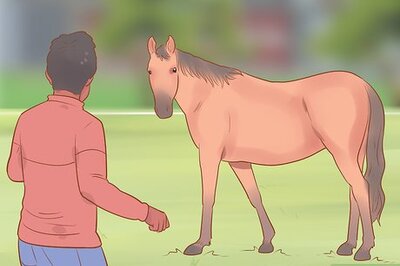
views
What is slow rolling in poker?
Slow rolling is when you waste time making a meaningless decision. There are often dozens of decision points in any given hand of poker, but many of them are deterministic. However, not all players know that. If you know for a fact that a given decision is meaningless but you take your time as if you’re weighing choices for a tough decision, you’re slow rolling. Slow rolling is considered a serious breach of etiquette. Seasoned players will become very hostile if they learn you slow rolled a hand. Here’s what slow rolling looks like: Say you’ve got a pair of aces in your hand. The table cards are a 2 of diamonds, an 8 of spades, an 8 of clubs, and two aces—one of hearts and one of clubs. There is no possible hand any player could possibly have to beat your four of a kind. Now, say you’re “heads up” (alone) with another player and they go all-in. You should immediately call—there’s no way folding makes sense, so there’s nothing to really debate. If you take 45 seconds before calling, you’d be slow rolling.
Why is slow rolling bad?
Slow rolling delays the game and wastes everyone’s time. Poker is supposed to be fun, and sitting around watching a player stare at their cards while thinking about a decision isn’t that. But players will understand all that staring and thinking if the decision ends up being really important. So, when players find out it was a pointless decision, they get especially annoyed. That’s why slow rolling is considered bad sportsmanship at best, and intentionally disrespectful at worst. Picture a game of basketball where a player at the free throw line just keeps bouncing the ball over and over again, or a game of soccer where the penalty kicker just stares at the ball for a full minute before kicking it. These would be comparable to slow rolling.
What’s the difference between slow rolling and slow playing?
Slow playing is when you take your time to make an important decision. Some players may not enjoy a player who slow plays over every single decision, but they won’t assume that player is behaving in bad faith. Some hands are just complex and require more time to think through, and that’s okay! There are times every poker player should slow play as they navigate complicated hands with a lot of moving parts, but nobody should ever slow roll. Slow playing is more commonly known among poker players as “being in the tank” or “tanking.” Where’s the line? If there’s a fringe 5% chance your opponent has you beat and you spend 90 seconds weighing your choices, most players will say you’re slow rolling. A slow play hand typically requires two reasonably likely outcomes (at a minimum).
What’s the difference between slow rolling and Hollywooding?
Hollywooding is any performance designed to trick other players. Basically, Hollywooding is a slow roll where the goal is to get other players to think you’re struggling to make a decision when you actually aren’t. Hollywooding is a completely appropriate way to avoid giving away free information, help you bluff, or trick players into thinking your hand is much different than what it actually is. For example, say you’ve got a jack and a 10 and the flop is a 9, 8, and queen. You’ve got a straight! Now, lets say the three players ahead of you all raise one another. It should be an easy call for you, but calling too quickly might make everyone think you have the straight, and you may want to lure them into putting more chips in the pot. So, you might “Hollywood” a bit by pausing and making “thinking” faces to make everyone think you have something closer to a pair or two pair. Hollywooding refers to any behavior designed to trick players into thinking your hand is different. In our example, if you said something like “boy, it’s close…” while you (air quotes now) “think,” would be Hollywooding as well.
How to Avoid Slow Rolling
Pay attention to the table when it’s not your turn. A lot of the time, new players end up accidentally slow rolling just because they aren’t super aware of when they’ve been handed a point in the game where there really isn’t any decision to make. Focus at the table and keep track of each player’s game actions in each hand. This way, you won’t forget that a player already signaled they have a weak hand or miss out on the fact that everyone else has already checked. This is especially important if you’re the cut off (i.e. the last player at the table to act), since the cut off is the most likely to be handed deterministic decisions.
Don’t say or do anything to give a player false hope. If you’re highly likely to win a hand, don’t make snide comments, ham it up like you’re destined to lose, or waste time at the table Hollywooding or slow playing. There’s a big difference between bluffing when a hand could break either way on the river card and hamming it up on the last round at the table when you opponent checked and you’re 100% to win. If you’re new to the game and you accidentally slow roll because you didn’t realize you were locked in to win a hand, just apologize and explain you’re new. A large part of avoiding slow rolls is being able to identify when you’re already going to win and you’ll get better at that with experience.
Reveal your cards quickly once you’ve won a hand. It’s considered an especially egregious slow roll if your opponent flips their hand over and you take your sweet time to turn your cards over. This is actually considered worse than the typical slow roll since there’s really zero reason to ever delay the reveal of a winning hand, so you’re very likely to catch some flack for this.
Other Key Poker Etiquette
Angle shooting Angle shooting is when you don’t explicitly break the rules, but you bend them as far as you can to try tricking other players. For example, say you pretend to fold by beginning to slide your cards towards the dealer to see if an opponent makes a surprised face or breathes a sigh of relief, but then you pull the cards back and “change your mind.” This is considered seriously bad sportsmanship. Poker is a social game with a lot of moving parts, and there are a lot of ways to try and sneak information out of other players. Respect the spirit of the game.
String betting When you bet in poker, you must make your bet—and move your chips for that bet—all at once. If you want to bet $25, you can’t go, “I will bet $5…actually, let’s make it $25.” This is known as string betting, and it’s considered bad etiquette. It can trigger a reaction in an opponent between the two bets, and it can be seen as deceptive. Only bet once you’re 100% confident in the amount that you’re about to bet. It’s better to slow play a bit while weighing the size of your bet than to rush it and end up string betting.
Hitting and running This only applies to cash games, but hitting and running is when you win a big pot and then immediately leave. This takes money off of the table, which immediately changes the dynamics of the game and diminishes the ability of players who are behind to get their money back. If you hit it big, play the game out if you can. This is okay behavior if you’re at a casino and you aren’t playing with friends. If it’s a low-stakes cash game among friends though, try to avoid booking it as soon as you’re up.
Chip hiding Don’t mix your chips up—always keep them in separate piles based on their amounts. Also, avoid tucking some chips behind large stacks or obscuring the chips with your forearm. The amount of chips you have at any given time is public information, and hiding the chips goes against the spirit of that rule. If a player ever asks you how much you have, you’re obliged to tell them.
Discussing the hand out of turn If someone else is in the tank while they weigh a big decision and it’s not your turn, or you fold and the other players are engaged in the hand, don’t talk. There’s nothing that you could say that wouldn’t potentially bother someone, so just hang out and keep your thoughts to yourself. This is a little different if you’re among friends and it’s not a high-stakes game. Feel free to joke around with your buddies if it isn’t your turn or you aren’t in the hand.




















Comments
0 comment